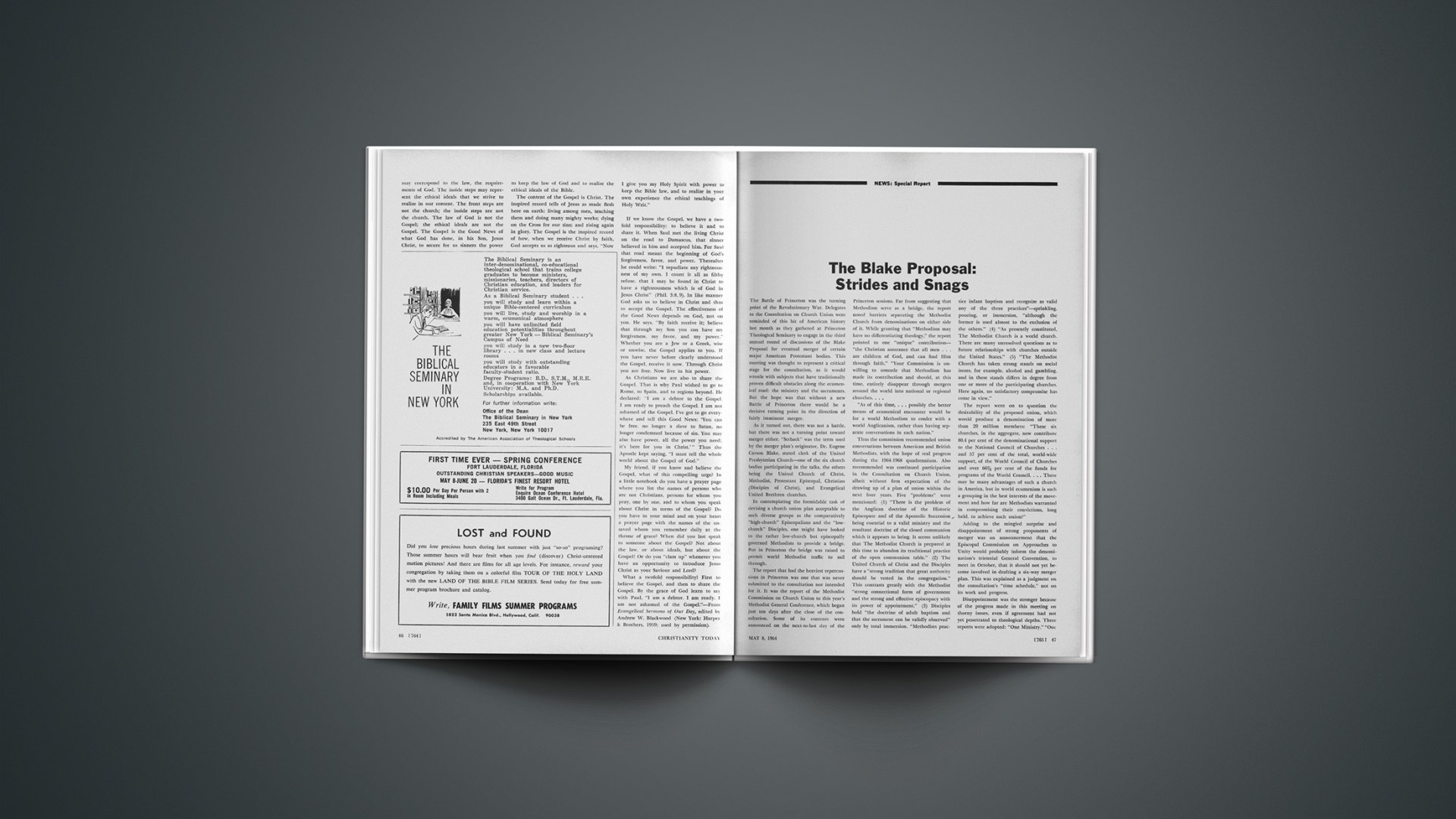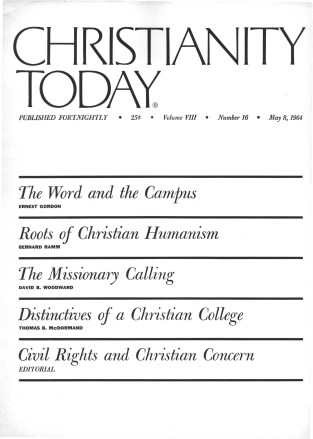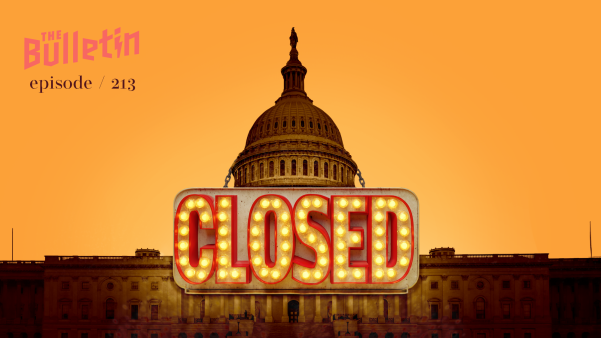The Battle of Princeton was the turning point of the Revolutionary War. Delegates to the Consultation on Church Union were reminded of this bit of American history last month as they gathered at Princeton Theological Seminary to engage in the third annual round of discussions of the Blake Proposal for eventual merger of certain major American Protestant bodies. This meeting was thought to represent a critical stage for the consultation, as it would wrestle with subjects that have traditionally proven difficult obstacles along the ecumenical road: the ministry and the sacraments. But the hope was that without a new Battle of Princeton there would be a decisive turning point in the direction of fairly imminent merger.
As it turned out, there was not a battle, but there was not a turning point toward merger either. “Setback” was the term used by the merger plan’s originator, Dr. Eugene Carson Blake, stated clerk of the United Presbyterian Church—one of the six church bodies participating in the talks, the others being the United Church of Christ, Methodist, Protestant Episcopal, Christian (Disciples of Christ), and Evangelical United Brethren churches.
In contemplating the formidable task of devising a church union plan acceptable to such diverse groups as the comparatively “high-church” Episcopalians and the “low-church” Disciples, one might have looked to the rather low-church but episcopally governed Methodists to provide a bridge. But in Princeton the bridge was raised to permit world Methodist traffic to sail through.
The report that had the heaviest repercussions in Princeton was one that was never submitted to the consultation nor intended for it. It was the report of the Methodist Commission on Church Union to this year’s Methodist General Conference, which began just ten days after the close of the consultation. Some of its contents were announced on the next-to-last day of the Princeton sessions. Far from suggesting that Methodism serve as a bridge, the report noted barriers separating the Methodist Church from denominations on either side of it. While granting that “Methodism may have no differentiating theology,” the report pointed to one “unique” contribution—“the Christian assurance that all men … are children of God, and can find Him through faith.” “Your Commission is unwilling to concede that Methodism has made its contribution and should, at this time, entirely disappear through mergers around the world into national or regional churches.…
“As of this time, … possibly the better means of ecumenical encounter would be for a world Methodism to confer with a world Anglicanism, rather than having separate conversations in each nation.”
Thus the commission recommended union conversations between American and British Methodists, with the hope of real progress during the 1964–1968 quadrennium. Also recommended was continued participation in the Consultation on Church Union, albeit without firm expectation of the drawing up of a plan of union within the next four years. Five “problems” were mentioned: (1) “There is the problem of the Anglican doctrine of the Historic Episcopate and of the Apostolic Succession being essential to a valid ministry and the resultant doctrine of the closed communion which it appears to bring. It seems unlikely that The Methodist Church is prepared at this time to abandon its traditional practice of the open communion table.” (2) The United Church of Christ and the Disciples have a “strong tradition that great authority should be vested in the congregation.” This contrasts greatly with the Methodist “strong connectional form of government and the strong and effective episcopacy with its power of appointment.” (3) Disciples hold “the doctrine of adult baptism and that the sacrament can be validly observed” only by total immersion. “Methodists practice infant baptism and recognize as valid any of the three practices”—sprinkling, pouring, or immersion, “although the former is used almost to the exclusion of the others.” (4) “As presently constituted, The Methodist Church is a world church. There are many unresolved questions as to future relationships with churches outside the United States.” (5) “The Methodist Church has taken strong stands on social issues, for example, alcohol and gambling, and in these stands differs in degree from one or more of the participating churches. Here again, no satisfactory compromise has come in view.”
The report went on to question the desirability of the proposed union, which would produce a denomination of more than 20 million members: “These six churches, in the aggregate, now contribute 80.4 per cent of the denominational support to the National Council of Churches … and 57 per cent of the total, world-wide support, of the World Council of Churches and over 66⅔ per cent of the funds for programs of the World Council.… There may be many advantages of such a church in America, but in world ecumenism is such a grouping in the best interests of the movement and how far are Methodists warranted in compromising their convictions, long held, to achieve such union?”
Adding to the mingled surprise and disappointment of strong proponents of merger was an announcement that the Episcopal Commission on Approaches to Unity would probably inform the denomination’s triennial General Convention, to meet in October, that it should not yet become involved in drafting a six-way merger plan. This was explained as a judgment on the consultation’s “time schedule,” not on its work and progress.
Disappointment was the stronger because of the progress made in this meeting on thorny issues, even if agreement had not yet penetrated to theological depths. Three reports were adopted: “One Ministry,” “One Baptism,” and “One Table.” Excerpts follow.
• “One Ministry”: “We believe that in a servant church that is truly catholic, truly reformed, and truly evangelical, the ministerial orders should include the historic ministries of bishops, presbyters (elders) and deacons. We further believe that these ministries can be constituted for the united Church without prejudice to the existing ministerial orders in the several churches.” It was granted that further clarification was needed of the ministerial orders and their functions. This is to be the general area of study preparatory for next year’s meeting.
But consensus on inclusion of bishops was viewed as a major gain inasmuch as three of the churches do not now have an episcopacy. On the other hand, one member of the committee that drafted the report was not sure why it did not point out existing disagreements more clearly. Two of the Episcopal delegates made statements that pointed to vexing problems yet remaining. Professor William J. Wolf of Episcopal Theological School, Cambridge, Massachusetts, stressed that his delegation was under a mandate from the denomination’s General Convention and the Anglican Lambeth Conference not to enter into any discussion on the ministry except within the context of the historic episcopacy. He said this involved a threefold ministry of bishop, priest, and deacon. Bishop Richard S. Emrich of Detroit said that he believed Episcopalians would insist on “reordination in some sense” for ministers whose churches would be accepting the episcopate.
• “One Baptism”: “Baptism is a divine ordinance or sacrament and forms the visible basis of our unity. By this we are united with Christ in His death and resurrection, and are born again of water and the Spirit, knowing ourselves to be taken up into God’s plan of salvation. We receive the washing away of sin, and incorporation as living members into the body of Christ.” The subject of baptismal regeneration did not become a matter of debate in plenary sessions.
Views for and against infant baptism were described. “In spite of tensions within our communions, and weaknesses of practice, infant baptism and adult baptism both seek to express and fulfill the same spiritual life. Both seek to include infants within the one fold of Christ’s Church, and both seek to nurture these little ones in the faith which thereby can reach mature, responsible expression.” “Neither infant baptism nor adult baptism would be imposed contrary to conscience.”
As to mode, the report said: “The New Testament does not lay great stress on the particular manner in which baptism is administered. It seems clear, however, from the Biblical record that immersion was usually practiced in New Testament times. We acknowledge that as early as the first part of the second century effusion (i.e. baptism by pouring water) was practiced by the Church, and since that time there has been variety in baptismal practices. In a united Church it would be possible to baptize by immersion, pouring, or sprinkling.” Deleted was a first draft plea that because of New Testament practice and “theological reasons we urge our participating churches to consider adopting” the mode of immersion. This mode was described by one supporter of the plea as “the ecumenical form” inasmuch as all churches recognize it as baptism. But the admitted “trial balloon” was exploded by objections to abandoning the other traditional modes.
• “One Table”: “We believe it is not necessary in a uniting church that all parties be in complete agreement upon the total range of sacramental theology.” More than simply a memorial view of the Eucharist was described: “Christ is present as the Crucified who died for our sins and who rose again for our justification, as the once-for-all sacrifice for the sins of the world who gives himself to the faithful. His life and death and resurrection are not only remembered by the Church but also become, by God’s action in Christ, present and efficacious realities.
“The Church corporate and its members are renewed in the covenant of grace and participate in the forgiveness of sin and receive eternal life.”
When asked whether open and closed communion had been debated, a delegate told the press that one working group had discussed the problem without resolving it.
The same preamble was attached to all three of the reports to clarify their status: “The Consultation sets forth these statements as consensus on the points covered. They are not to be thought of as expressing the full doctrinal position of any of our Churches, nor as an exhaustive treatment of the subjects covered, nor as representing final conclusions of the Consultation.…”
In other action, delegates adopted a recommendation that calls for a nationwide exchange of pulpits among ministers of the six participating churches on one Sunday in January of next year, where this is feasible.
For the first time, the Roman Catholic Church sent “observer-consultants” to the sessions.
Delegates varied in private predictions as to the date of possible successful completion of merger talks. After Princeton, 1975 was considered optimistic. Some of the more cautious pointed to the year 2,000.
Revival Behind Bars
Religious News Service reported a revival among convicts in Fulton County, Georgia, last month.
The Rev. Bill Allison, county prison chaplain, said thirty-four convicts were converted. Fourteen of them were subsequently transported to a Baptist church in Atlanta for baptism.
Allison said questionnaires had been distributed among prisoners asking if they would be willing to attend a service each night for a week. “The response was overwhelming,” he declared.
Week-long series were conducted at the Fulton Tower Prison and at prison camps at Bellwood, Stonewall, and Alpharetta. The Rev. Herman Conley, a minister active in work among inmates, assisted in the services at Stonewall.
A Heart For The Urban Heart
Philadelphia College of Bible plans to erect a twelve-story building in the heart of the city to provide additional classrooms, a chapel-auditorium, a library, a gymnasium, and office space. A tentative design was unveiled last month at the school’s Golden Jubilee banquet.
“This is a part of a master plan developed to alleviate current growing pains and meet projected enrollments through 1975,” said President Douglas B. MacCorkle.
The high-rise facility will be constructed adjacent to the school’s present eight-story edifice at 18th and Arch Streets, Philadelphia.
MacCorkle said enrollment applications are running 25 per cent ahead of last year’s rate. Current enrollment is more than 1,100.
PCB offers a bachelor of science degree in Bible with four study areas—missions, pre-theology, Christian education, and music.
School officials have announced that “PCB intends to involve itself in a professional approach to the urban social problem.” An “urban advance program with a heart for the heart of the city,” representing a new departure for Bible institutes and colleges, will be incorporated into the school’s curriculum.
The Uttermost Farthing
A new decree has been added to the incredible ties that bind members of one wing of Scotland’s Close or Exclusive Brethren (see “The Unequal Yoke,” CHRISTIANITY TODAY, News, August 31, 1962). The movement’s American-born “Archangel,” James Taylor, has dictated that on the death of a member, his estate shall go to Brethren funds. Funeral arrangements will be made by a Brethren undertaker, and non-believing (that is, non-Brethren) relatives, however close, are to be excluded from active participation. All funeral services are to be held in one town for the whole area concerned.
The yen for exclusivism is carried still further in another rule just announced, forbidding the 3,000 members to eat in public hotels and restaurants. If going on a journey, they are recommended to carry with them an apple, an orange, a boiled egg, and a flask of tea. For some reason they are strictly prohibited from buying fruit on their travels. A former member reports that hundreds have left the movement during the past three years of Mr. Taylor’s demanding regime.
J. D. DOUGLAS
The Council Exonerated
In England a Roman Catholic priest has blamed the Second Vatican Council for the declining number of converts in the past year or two. Father Francis Ripley, director of a Catholic information center in Liverpool, bases his view on the result of a survey he took. “Seventy-six letters,” he claims, “attribute the decline to the present friendly attitude of officials in the Church to non-Catholics and judge that this has had the effect of leading the separated brethren to believe not only that one Church is as good as another, but that we are coming to think that way also.”
A spokesman for the Archbishop of Westminster stressed that Ripley was speaking only for himself. While the official agreed that the idea of one church’s being as good as another completely contradicted Roman Catholic doctrine, he pointed out that seventy-six letters could scarcely be regarded as representative of Britain’s four million Roman Catholics. To attribute the falling number of conversions to any particular trend or movement was, he said, unwarranted.
J. D. DOUGLAS










